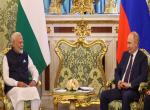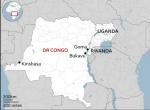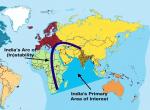The Iran-Hezbollah-Hamas axis and all those others pitted against Israel in the ongoing conflict in West Asia have demanded that Israel should vacate the territories it has occupied; territories they that they say belong to the Palestinians. If Israel accepts the demand there can be peace, they claim. This is the justification Israel’s adversaries give for their actions every time they conduct strikes on the Jewish nation, including terrorist attacks—such as the one Hamas launched on October 7 in 2023, which became the immediate trigger for the current confrontation.
Will the anti-Israel grouping mentioned above really give up its hostility to Israel if, hypothetically speaking, Israel gives up the supposedly occupied territories? That seems unlikely because countries like Iran have vowed to wipe Israel off the face of the earth. And, if the desire is only that Palestinians be given their land, then we must go back twenty-five years ago to the Camp David Summit of 2000, to test this premise.
Israeli Prime Minister Ehud Barak and Palestinian leader Yasser Arafat were hosted by US President Bill Clinton at Camp David in July that year, with Clinton playing a mediator in an effort to arrive at a peaceful settlement between the Palestinians and the Israelis. A Left-leaning politician with long experience in governance and the military, Barak proposed to the Palestinians what was by many accounts a generous deal. Agreeing to the formation of a Palestinian state, he offered all of Gaza Strip and two-thirds of West Bank to Arafat for a Palestinian nation; over time, Palestine could have nearly 90 per cent of West Bank. Barak also said that East Jerusalem could become the capital of the new Palestinian state.
There were several sub-proposals but the above were the main highlights. Quoting a newly declassified documents, the Times of Israel in a 2023 report said that Barak had in principle even agreed to give up Israel’s sovereignty in certain areas of Jerusalem’s Old City, including the disputed Temple Mount, during the 2000 negotiations. There is some confusion here, as some reports said that Barak had offered custodianship and not sovereignty to the proposed Palestinian nation. But even custodianship was a major concession by Israel.
Overall, the offer package was good but Arafat was not keen on accepting it. He needed a reason for the rejection, though, and thus put a condition that all the Palestinian refugees displaced from Israel prior to 1967, be allowed to return to their places. He knew that Barak would not accept this condition, and he was right. Israel was worried that allowing the right of return would result in an influx of Palestinians and completely change the demographics of the country, which would have an adverse impact on Israel’s Jewish character as well as its national security. That is how the Camp David summit of 2000 failed. Speaking on it, Ehud Barak, according to a 2020 report in The Jerusalem Post, said: ‘We did not succeed because our Palestinian neighbours have not yet internalised the fact that in order to achieve peace, each side has to give up some of their dreams; to give, not only to demand’.
But why had Arafat obstinately refused the offer, or in Barak’s words, turned down the ‘give-and-take’? Mosab Hassan Yousef writes in his book, Son of Hamas, ‘Yasser Arafat had grown extraordinarily wealthy as the international symbol of victimhood. He wasn’t about to surrender the status and take on the responsibility of actually building a functioning society.’ He wanted to be known as a Palestinian leader ‘who had thumbed his nose at the president of the United States, as someone who had not backed down and settled for less, and as a leader who stood tough against the entire world’.
The anti-Israel camp can dismiss Yousef’s analysis as one coming from a traitor to the Palestinian cause, as a betrayer who became an agent of Shin Bet, one of Israel’s premier intelligence organisations. Yousef does not shy away from this fact; in fact, he explains in the book why and how he worked for the Shin Bet. But there is another fact that renders his observations important. He is the son of one of the founders of Hamas. He had a ringside view of the functioning of Hamas as well an inside information of the various peace attempts being made. He writes that his Shin Bet handler was aghast at the offer Ehud Barak had made, and remarked: ‘What is this guy doing? We never thought our leaders would give up what they offered Arafat. Never! And he [Arafat] said no?’
The other reason for the summit’s failure was that not enough groundwork had been done in view of the over-eagerness of Clinton and Ehud Barak to look good. Clinton was still reeling under the impact of the Monica Lewinsky scandal and was desperate to refurbish his image. Barak, who was politically weak back home, wanted to showcase an achievement to his people. Both the leaders failed to read Arafat’s intentions and strategy. The Palestinian leader was in no hurry to arrive at a settlement.
In fact, after the meet failed, he seemed hardly despondent, for he received a rousing welcome from his people. And, soon after, the violent Second Intifada or revolution was launched, which convinced the Israelis that Arafat had never been keen to end the conflict. More than a hundred suicide bombings that targeted Israeli civilians were carried out by Palestinians militants, while rocket attacks and gunfights became common features of the uprising. According to some estimates, more than 4,000 people (Palestinians and Israelis) lost their lives. Ehud Barak’s image plummeted; he lost the prime ministership to Likud party leader Ariel Sharon by a wide margin. Clinton had to live with the reputation of having failed miserably as a mediator. The only ‘victor’ was Yasser Arafat.
Regardless of which side’s views one accepts, the fact is that the Camp David Summit of 2000 came close to a settlement with an offer by Israel, and but for Arafat’s rejection, perhaps an Israel-Palestine agreement then would have established peace in the region.
(The paper is the author’s individual scholastic articulation. The author certifies that the article/paper is original in content, unpublished and it has not been submitted for publication/web upload elsewhere, and that the facts and figures quoted are duly referenced, as needed, and are believed to be correct). (The paper does not necessarily represent the organisational stance... More >>











Post new comment